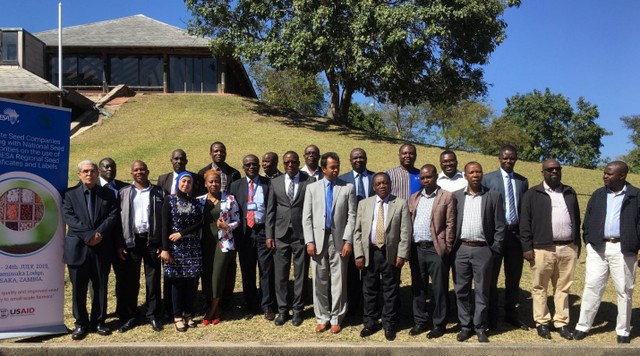
Regional seed trade in the COMESA countries stands at USD 2 billion but this is set to rise to USD 5 billion by 2025 with the implementation of new initiatives. One of them is the rolling out of the COMESA seed labels and certificates.
The development of the labels and certificates is part of the implementation of the COMESA Seed Harmonisation Implementation Plan (COMSHIP) aimed at facilitating regional seed trade. COMESA Agriculture Ministers endorsed the COMESA Seed Trade Harmonisation Regulations in 2015 leading to the launch of the COMSHIP programme to expedite implementation both at national and regional level.
Recently, the Alliance for Commodity Trade in Eastern and Southern Africa (ACTESA) a COMESA Specialized Agency conducted a training for chief executives and technical managers of nine private seed companies on ordering, activation and purchasing of the COMESA seed labels.
This was intended to trigger the use of the labels and regional certificates and encourage participation in trading on the COMESA Harmonized Seed Trading Platform.
Addressing the participants, Secretary General Chileshe Kapwepwe said the potential of the total seed market in the region remains high at two million metric tonnes of quality improved seed. The region is currently producing and accessing less than 500,000 metric tonnes of the seeds.
“This scenario has contributed to the high levels of food insecurity and hunger as production is affected by farmers who do not use high quality and improved seeds in their fields,” Ms Kapwepwe said in a speech presented by the Director of Agriculture and Industry Mrs. Providence Mavubi.
Limited use of quality seeds in the region is attributed to fragmented and small regional and national seed markets with each country operating its own seed policies and regulations different from other Member States.
Seed companies enter each of the national seed markets separately and individually, a situation which leads to high costs of operations, prolonged delays before good quality seed can find its way to the small-scale farmers.
In view of this, the COMESA Seed Trade Harmonisation Regulations were developed to enhance seed production, seed trade, reliability, and increasing competitiveness of the seed industry in the region.
The regulations are implemented through COMSHIP. So far, eight COMESA countries have completely aligned their national seed laws to the COMESA seed system.
“This means that 13 seed companies with varieties on the COMESA Variety Catalogue can now trade using the regulations in Burundi, Egypt, Malawi, Rwanda, Kenya, Uganda, Zambia and Zimbabwe,” the Secretary General said.
In line with COMSHIP, the COMESA seed labels and certificates will be utilized by seed companies for large seed consignments crossing the border and in-country seed trade in smaller packages.
In most COMESA countries, pre-inspection of seed consignment shall not be necessary as long as the variety is registered on the COMESA Variety Catalogue. Once registered, the variety does not have to be tested again and can be imported, marketed and, if necessary, produced in any country in the COMESA region.
The following seed companies participated in the training: Advanta Seeds, Pannar seeds, Corteva Seeds, Solynta Seeds, mPedigree, Syngenta, Seedco, Kenya Seeds, SeedAssure, Seed Science Technology and Systems Malawi, and African Seed Trade association (AFTSA).




